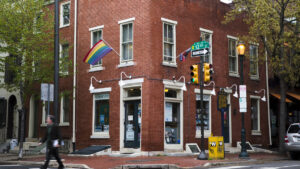Recently, NPR covered the oldest LGBTQ bookstore in the U.S. Giovanni’s Room in Philadelphia almost closed its doors forever back in 2014 because of financial difficulties. The unique shop for queer and trans literature had to reinvent itself to survive.

Shown is Ed Hermance’s Giovanni’s Room, the nation’s oldest gay bookstore on Tuesday, April 29, 2014, in Philadelphia. Hermance has owned the store for four decades but says independent bookstores are having a hard time competing with e-tailers like Amazon and that he plans to close the doors for good next month. (AP Photo)
Michaela Winberg of NPR member station WHYY explained how Giovanni’s Room survived and why it’s not just a place for books today. She talked to Kelly Rial who first visited the shop in the 1970s before she’d come out as trans. While Rial wanted to explore her identity, she was also worried about being discovered.
It’s an experience Rial finds to be common. People visit the story, looking around to make sure no one saw them enter.
In her 70s now, Rial considered the store a haven. There she could find gay memoirs, lesbian works of nonfiction, muscle magazines, feminist journals, and LGBTQ-friendly guides to major cities. She credits the store with helping her figure out who she was and to eventually come out.
Rial explained that it was comfortable for her. She felt that she could be out in the open and talk about issues that she couldn’t anywhere else at the time.
Giovanni’s Room had only been open a few decades when financial trouble hit. The owner said by 2014, he’d lost so much money he had to close its doors, explaining that the popularity of large online bookstores had taken its toll. He explained to the press that he didn’t see a way that a new owner could make the shop profitable without making drastic changes.
And that’s just what they did.
Current store manager Alan Chelak said that continuing the legacy of the bookstore was vital to them from the start. He took the responsibility of reopening the shop in September 2014. Chelak also works for Philly AIDS Thrift, a local nonprofit thrift shop. It was that organization that came in to buy the failing bookstore and make the changes that would save it.
The first thing they considered was the diversity of the bookstore’s inventory. They noticed there weren’t a lot of titles by trans authors for trans folks. They knew in order for their efforts to be successful, that they needed to have literature there for anyone who walked in, regardless of who they were or their background. They wanted to reimagine the shop so that anyone could walk in and find a book about a person like them, written by a person like them.
Chelak also proposed the idea of selling secondhand goods. He explained that you can also buy CDs, DVDs, records, vintage clothing, and all types of out-of-the-ordinary ephemera from all across the world. These are items that folks in the community donate to Giovanni’s Room.
It turned out to be a good idea because the thrift store part of the store revived it. Giovanni’s Room was able to outlast the only other LGBTQ bookstore that preceded it — the Oscar Wilde Memorial Bookshop in New York City. It closed in 2009. With Chelak’s leadership, the store made a profit for the first time in years. They saved enough in four years to buy the building.
Chelak explained buying the building enabled them to secure the legacy of the store for the next generation. Their customers are very pleased that Giovanni’s Room is still around.
Rial considers its survival significant because it supports the community. She works at the store now two days a week. She said that the store has people come in who are still in the closet because it’s not safe for them to come out for whatever reason. The store gives them a place to be comfortable and safe.
